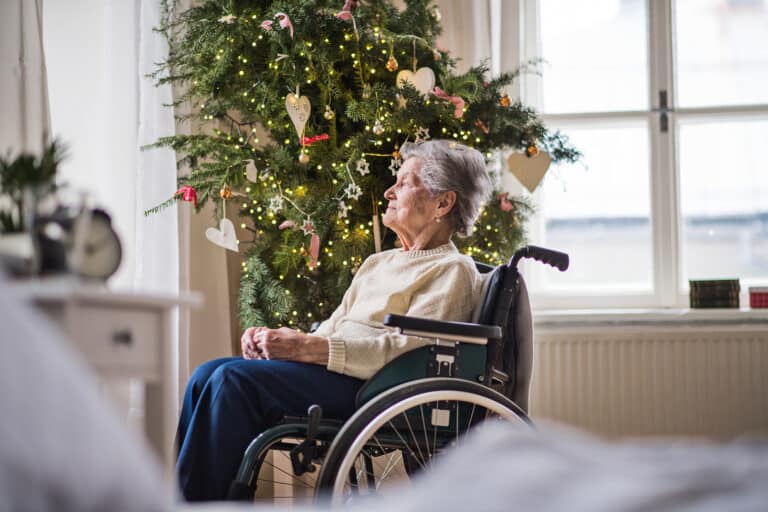This phenomenon has been named “Grinch Syndrome,” in reference to the iconic character created by Dr. Seuss, it is a colloquial term used to describe the emotional state that increases as holiday celebrations intensify. December is a month full of joy, reunion, love and traditions. The most awaited month for many of us, but for others, it is just an emotionally overwhelmed month where they feel lonely, social pressure or might be coping with the loss of a loved one, their traditions or their independence.
What we should know about adult isolation during the holiday
Just as families get together and spend time during the holiday season, it is important to pay close attention to the elderly. This is a time when cases of depression, anxiety and sadness increase. In the US adults 65 and older live alone, many might think this is the main reason for them to fall into depression, but this is not the only factor that makes them lonely. Besides the meaningful connections they have, the most common reasons are:
1) The distance from relatives. It’s normal when growing up we all take different directions, we migrate to other countries or move to other states, which makes it difficult to gather every other week and during the holidays.
2) Limitations in life. When aging you are unable to work as much and your income is limited or you depend on a pension, this leads to financial changes where giving yourself and others the treats you could before is no longer feasible.
3) Traditions change. Older adults go through times of loss, whether it be the loss of a friend, a partner, a loved one, loss of their abilities, in some way the ability to generate income, they feel that they no longer fit in the family as before, so all these things influence elders to lose interest in activities during the holidays due to grief and to avoid the dissatisfaction of doing things as they remember.
How to help elders deal with the holidays
It is thought that when a person is depressed or sad they cry and in many cases this happens but unlike younger people, when older adults enter a state of depression their attitude changes, they become irritable, they isolate themselves, they deny and blame their problems on others. By understanding the changes that older adults can experience, we can act to get closer to our loved ones who are having a difficult time at this time of the year.
1) Have a conversation
When we begin to see that there is no longer a desire or excitement for activities, then we should ask them what is happening, how they feel, and if there is any way to help. Always let them know you are there for them and create a safe space where they can share their feelings without judgement.
2) Meaningful interactions
Some older adults go days without someone visiting, speaking over the phone or even worse for those elderly who have poor health and live in nursing homes where family will only go once a week/month or sometimes only for their birthday. It is important to take the time to visit the elderly, although we know it can be difficult. With today’s technology advancement, a video call, a postcard, a gift made by your entire family will be helpful.
3) Keeping holiday traditions alive
While it is true that we cannot relive the past, much less the people who were part of it, we can continue to remember traditions with love and joy. One way to help is also to add new traditions that remind us of those who are no longer here so that it feels like they are still present during these dates. Immortalize moments in videos or getting together with family and reliving moments by looking at photographs or projections and being thankful for life and the experiences lived. It is not necessary to follow all traditions. Opting for the essentials and what truly brings well-being can help reduce stress.
4) Encourage elders to integrate in social activities
Places like the Church, communities, support groups, senior centers, are places that offer group activities, especially on holidays. In these places, older adults can find people with the same tastes and beliefs, where they can create new meaningful connections. What we can do is accompany them for the first time so that they do not feel so alone.
5) Create new hobbies
Older people may feel frustrated by activities they can no longer do due to a disability or the simple fact that they are no longer young. If they don’t currently have any hobbies, you can ask if there is anything they used to do when they were younger that they’d like to get back into or try. It is good to encourage them to join reading, knitting, crafts groups or start their own hobby. Remember not to force or impose activities where they don’t feel comfortable.
The whole point of the holiday is to spend quality time with friends and family. If you or an older adult close to you is feeling lonely, you already know how to help, but it’s always best to start small. Remember that sometimes people don’t feel emotionally ready to participate in activities with new people or in large groups. If you notice that even after trying these tips, your older adult is still withdrawn and down, they may have depression. You can seek professional help, take the first step by filling out this free, anonymous depression screening questionnaire.
Sources
https://newsroom.thecignagroup.com/loneliness-epidemic-persists-post-pandemic-look
https://thestayton.com/blog/health-wellness/understanding-why-holidays-can-be-difficult-for-older-adults/
https://www.mayoclinichealthsystem.org/topics/grief
https://www.ncoa.org/article/four-steps-to-combat-loneliness-in-seniors-during-the-holiday-and-beyond/
- Home Care Assistance Can Help Seniors Manage Self-Care Tasks - April 24, 2025
- The Superfood You Shouldn’t Miss - April 9, 2025
- First Home Care Visit? Here’s The Inside Scoop - April 9, 2025


